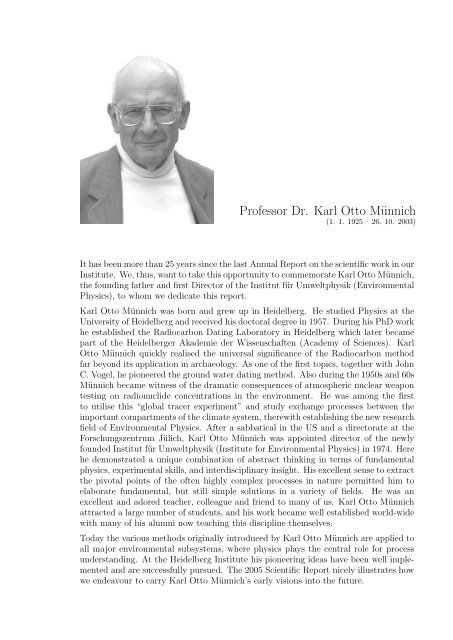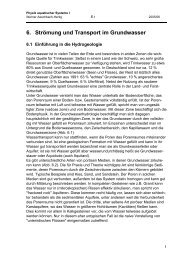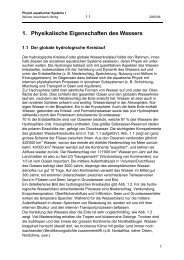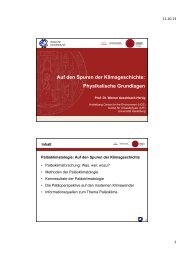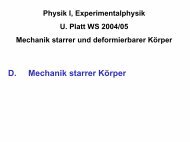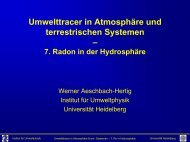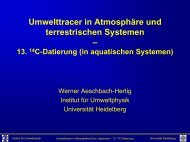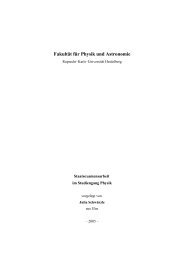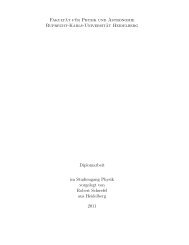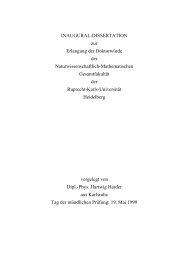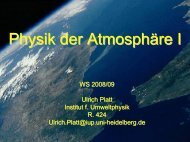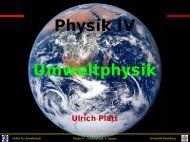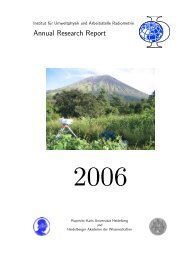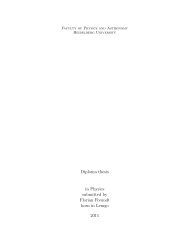download pdf - Institut für Umweltphysik - Ruprecht-Karls-Universität ...
download pdf - Institut für Umweltphysik - Ruprecht-Karls-Universität ...
download pdf - Institut für Umweltphysik - Ruprecht-Karls-Universität ...
You also want an ePaper? Increase the reach of your titles
YUMPU automatically turns print PDFs into web optimized ePapers that Google loves.
Professor Dr. Karl Otto Münnich<br />
(1. 1. 1925 – 26. 10. 2003)<br />
It has been more than 25 years since the last Annual Report on the scientific work in our<br />
<strong>Institut</strong>e. We, thus, want to take this opportunity to commemorate Karl Otto Münnich,<br />
the founding father and first Director of the <strong>Institut</strong> <strong>für</strong> <strong>Umweltphysik</strong> (Environmental<br />
Physics), to whom we dedicate this report.<br />
Karl Otto Münnich was born and grew up in Heidelberg. He studied Physics at the<br />
University of Heidelberg and received his doctoral degree in 1957. During his PhD work<br />
he established the Radiocarbon Dating Laboratory in Heidelberg which later became<br />
part of the Heidelberger Akademie der Wissenschaften (Academy of Sciences). Karl<br />
Otto Münnich quickly realised the universal significance of the Radiocarbon method<br />
far beyond its application in archaeology. As one of the first topics, together with John<br />
C. Vogel, he pioneered the ground water dating method. Also during the 1950s and 60s<br />
Münnich became witness of the dramatic consequences of atmospheric nuclear weapon<br />
testing on radionuclide concentrations in the environment. He was among the first<br />
to utilise this “global tracer experiment” and study exchange processes between the<br />
important compartments of the climate system, therewith establishing the new research<br />
field of Environmental Physics. After a sabbatical in the US and a directorate at the<br />
Forschungszentrum Jülich, Karl Otto Münnich was appointed director of the newly<br />
founded <strong>Institut</strong> <strong>für</strong> <strong>Umweltphysik</strong> (<strong>Institut</strong>e for Environmental Physics) in 1974. Here<br />
he demonstrated a unique combination of abstract thinking in terms of fundamental<br />
physics, experimental skills, and interdisciplinary insight. His excellent sense to extract<br />
the pivotal points of the often highly complex processes in nature permitted him to<br />
elaborate fundamental, but still simple solutions in a variety of fields. He was an<br />
excellent and adored teacher, colleague and friend to many of us. Karl Otto Münnich<br />
attracted a large number of students, and his work became well established world-wide<br />
with many of his alumni now teaching this discipline themselves.<br />
Today the various methods originally introduced by Karl Otto Münnich are applied to<br />
all major environmental subsystems, where physics plays the central role for process<br />
understanding. At the Heidelberg <strong>Institut</strong>e his pioneering ideas have been well implemented<br />
and are successfully pursued. The 2005 Scientific Report nicely illustrates how<br />
we endeavour to carry Karl Otto Münnich’s early visions into the future.


